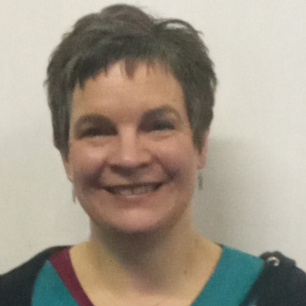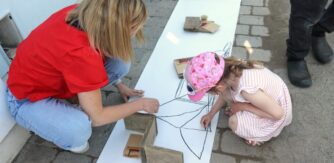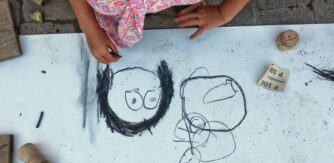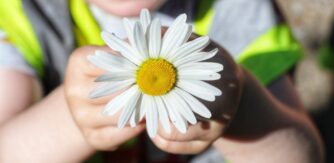Blog 2 – Lucy Davey, Educator, Farmyard Miniworld, (Ballintogher Playschool)

Close up of the open palms of a child's hands covered in soap bubbles. Image Credit Anna Leask

Lucy Davey is a qualified Mental Health Nurse, Play Therapist and Early Years Educator, she owns and manages, Farmyard Miniworld (Ballintogher Playschool), a small, independent, Playschool, located in the semi-rural county Sligo village of Ballintogher.
Surrounded by picturesque landscape, including mountains, farmed and natural spaces, modern and ancient structures, Ballintogher is the perfect location for children to grow and play.
Lucy has an abiding commitment towards truly free play and her practice emphasises the benefits accrued by children, and their adults, of time spent outdoors and in the company of nature.
In her blog series, Lucy discusses her experience of being part of the Arts in Early Learning and Care (ELC) and School Age Childcare (SAC) Pilot. Ballintogher Playschool was one of nine early years settings who participated in this national pilot scheme, working in collaboration with Kids’ Own Publishing and artists Maree Hensey and Naomi Draper. The pilot took place between May to December 2023 and supported professional artists and early years educators working together to explore the Draft Principles for Engaging with the Arts in Early Learning and Care (DCEDIY 2023).
The Adult’s Experience
Towards the end of our playschool year 2023 we had the pleasure of welcoming Kids’ Own associate artists Maree Hensey and Naomi Draper into our playspace, as our playschool took part in the Arts in Early Learning and Care (ELC) and School Age Childcare (SAC) Pilot. Embarking on a journey of creativity and learning together, we put the child’s experience at the centre.
Placing the child at the centre of practice requires a greater investment of energy from the adult. It is usually more stressful and certainly appears more chaotic and messy than putting the adult’s needs at the centre of practice.
In our space we try always to put the experience of the child at the centre of all we do – empowering for the child, exhausting for the adult! One of the many benefits of adopting a truly child-centred approach means that by the end of the year the group is very well defined, usually extremely confident, inclusive and cohesive with members confident, and comfortable within their own role and expectations. This can be beneficial when introducing new adults into the setting, allowing for the swift development of trust and rapport.
Strong leadership is important in ensuring that staff feel supported and secure in their role when new adults are introduced, especially staff are being asked to step away from their comfort zone into unfamiliar and unknown areas: e.g. “I’m rubbish at art…..I don’t know anything about art”. Thoughtful use of supportive, inclusive, non-threatening language can enhance and promote a feeling of mutual respect and encouragement, protecting positive outcomes for all of the adults involved.
We observed how the adults in the setting, both staff and artists, developed positive, supportive links, sharing the experience and learning that emerged through reflective practice: e.g. “I’ve noticed how ______ really loves working with charcoal….We should bring that resource into the playspace more often…..I really enjoyed working with the flowers, twigs, moss that we collected on the nature lane, I never thought of using them in that way before”.
Reflective practice should be a cornerstone of practice in the Early Years and is the hallmark of a high quality service – embracing new ways of doing things, seeking out and welcoming new challenges and reflecting upon this process empowers staff and encourages creative and innovative thinking.
The adult’s experience enhances the child’s experience.
Inviting the artists into our space elevated our practice and energised our thought processes, supporting our continued professional development.


